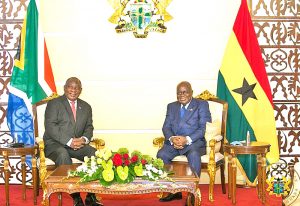President Nana Addo Dankwa Akufo-Addo will sign into law the contentious Electronic Transfer Levy (E-levy) policy document later this week.
Mr Osei Kyei- Mensah, Minister of Parliamentary Affairs and Majority Leader, disclosed this at a press conference in Accra on Tuesday.
When assented to by the President, the E-levy would become a law that binds every electronic money transaction to attract a 1.5 per cent charge.
Parliament approved the bill after amending portions of the document on Tuesday, despite a walkout staged by the Minority Caucus.
“President Nana Akufo-Addo will assent the bill by the close of the week,” Mr Kyei -Mensah said in a response to a question at the press conference.
He explained that a parliamentary committee was supposed to fine-tune the approved bill to ensure that all the necessary clauses were properly captured before the policy was presented to the President for his approval.
“Today, because of the Black Stars match, I am not sure that the committee can meet. I am sure in the week, it will be ready for the President’s assent,” the Majority Leader said.
The E-levy law has witnessed a long rejection from the Minority in Parliament and some stakeholders in the telecommunications space, but the government insisted the bill would restore confidence in the economy.
After the bill was presented to Parliament under the certificate of urgency, some months back, Minority and Majority Members of Parliament took turns debating on the subject with the usual hard-core positions.
During the second reading on Tuesday, the Minority Leader, Haruna Iddrisu, noted that his side would have nothing to do with E-levy in any form or shape.
“Mr Speaker, the Minority led by me will not be associated with any further proceedings on E-levy,” he said.
Soon after Mr Iddrisu’s comments, the Minority then, staged a walkout in protest, which went in favour of the Majority to duly undertake the second and third readings of the bill and subsequently passed it into law.
The levy, which was amended from 1.75 per cent to 1.5 per cent on Tuesday, March 29, 2022, and passed under a certificate of urgency, would be a tax on electronic transactions, which includes mobile-money payments.
The charge would apply to electronic transactions that are more than GH¢100 daily.
While critics of the proposal have warned that this new levy would negatively impact the financial technology space, as well as hurt low-income people and those outside the formal banking sector.
The government has, however, argued the levy would widen the tax net and that could raise an extra GH¢6.9 billion in 2022.
The levy has been the source of tension in Parliament since it was introduced in the 2022 budget.
Ashantibiz




